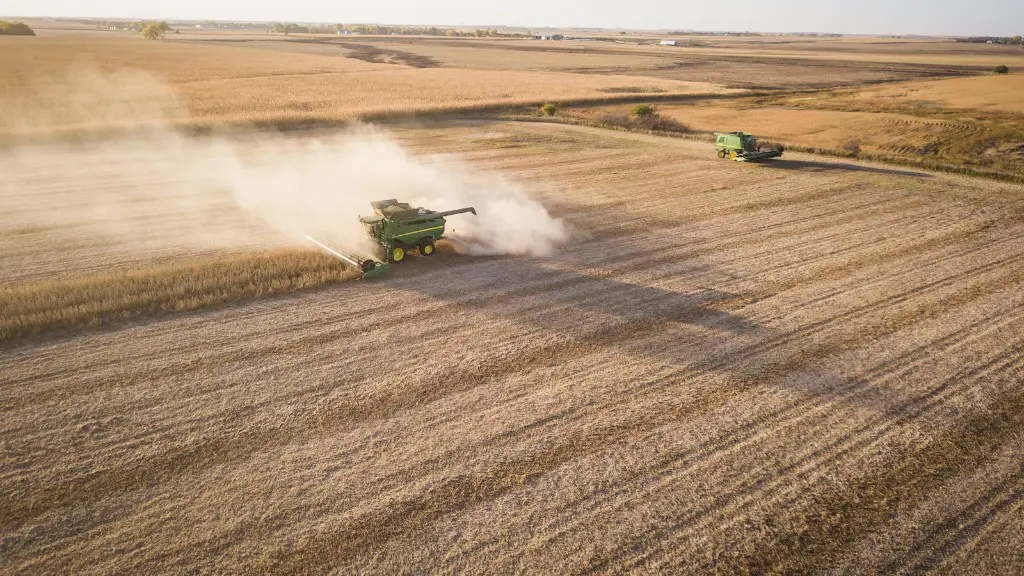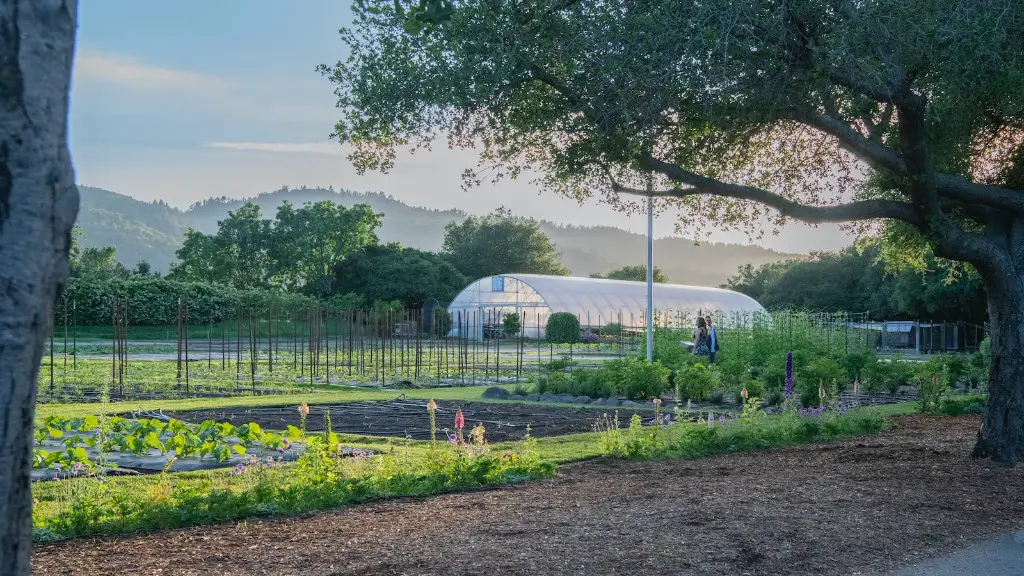There are many good reasons to study agriculture. For one, agriculture is a huge industry that is vital to the economy. Agriculture is also a very important part of our culture and heritage. Studying agriculture can help us better understand where our food comes from, how it is produced, and the environmental impact of agriculture. Additionally, agricultural research can help us develop new and more efficient methods of food production, which is important in a world with a growing population.
There are many reasons why agriculture is an important field of study. For one, agriculture is responsible for producing the food we eat. Without farmers and the expertise they have in producing crops, we would not have the food necessary to sustain our population. Additionally, agriculture is a major driver of the economy. In the United States, the agricultural industry is worth over $1 trillion. Understanding how to produce food and goods efficiently is crucial to maintaining a strong economy. Finally, studying agriculture can help us learn about the environment and how we can best steward the land. Farmers have a unique perspective on the natural world and the impact that humans have on it. By studying agriculture, we can learn how to create sustainable systems that will preserve our environment for future generations.
Why should we learn about agriculture?
Agriculture is important because it provides food, fiber and natural resources that we need every day. Agriculture education programs not only teach students how to be farmers, but also train tomorrow’s scientists, nutritionists, teachers and so much more. This is why agriculture is so important!
Agriculture can help reduce poverty, raise incomes and improve food security for 80% of the world’s poor, who live in rural areas and work mainly in farming. The World Bank Group is a leading financier of agriculture, with a commitment to help end poverty and boost shared prosperity. We invest in agriculture for the long term, supporting countries in their efforts to grow more and better food, increase productivity, and raise incomes.
What are 3 reasons why agriculture is important
1. It’s the main source of raw materials: Agriculture is the main source of raw materials for industries such as textile, leather, and wood.
2. It’s important to international trade: Agriculture is a key sector in international trade, with products such as coffee, cocoa, and fruit being traded all over the world.
3. It plays a big role in a nation’s revenue: Agriculture is a major contributor to a country’s GDP, with the sector often accounting for a large percentage of a nation’s total export earnings.
4. It provides employment: Agriculture is a major source of employment, with millions of people around the world working in the sector.
5. It’s crucial to a country’s development: Agriculture is essential for a country’s development, as it is a key driver of economic growth.
6. It can help heal the environment: Agriculture can play a role in environmental protection, as it can help to rehabilitate degraded land and promote sustainable land management practices.
7. It goes hand-in-hand with war: War and conflict often lead to food insecurity, and agriculture is often one of the first sectors to suffer in these situations.
8. It’s a vital part of
Farming is a great way to live a healthy lifestyle. It is challenging and stimulating work that provides a source of income in rural areas. Farm work also helps develop younger generations. Farming can help the environment thrive.
What is the positive impact of agriculture?
While the negative impacts of agriculture on the environment are significant, there are also positive impacts that can be made through certain farming practices. For example, agriculture can trap greenhouse gases within crops and soils, or mitigate flood risks. These positive impacts show that with proper management, agriculture can be a force for good for the environment.
Agriculture has been the foundation of human civilization for millennia. Out of agriculture, cities and civilizations grew, and because crops and animals could now be farmed to meet demand, the global population rocketed—from some five million people 10,000 years ago, to more than seven billion today.
Though the technology and methods of agriculture have changed dramatically over the years, the basic premise remains the same: by cultivation and husbandry of the land, we are able to produce the food and other resources that we need to sustain ourselves. Agriculture has thus been vital to the development and growth of human society, and will continue to be so in the years to come.
How important is agriculture in today’s society?
Agriculture is vitally important to human beings. It not only provides us with food, clothing, and shelter, but also helps us to enjoy a higher quality of life. Agriculture has been a part of human society for thousands of years, and it will continue to be an important part of our lives for many years to come.
The agricultural revolution was a time when people started to farm and grow their own food. This was a major change from the nomadic life that people had been living before. When people started to settle down in one place, they were able to grow more food and no longer had to wander around to find it.
Is agriculture important to society
Agriculture plays a vital role in the global economy and is responsible for feeding billions of people around the world. It is also one of the most important industries in terms of employment, with over 1 billion people employed in the sector.
The sector is also important in terms of environmental protection, as agricultural land occupies around 50 percent of the world’s habitable land. Agricultural land provides habitat and food for a multitude of species, and is therefore essential for biodiversity.
Agriculture can have a big impact on the environment, both positive and negative. It can lead to soil erosion and water pollution, and contribute to climate change and deforestation.
What are 3 interesting facts about agriculture?
Here are five interesting facts about agriculture:
1. Agriculture is the single largest employer in the world.
2. There are 914 million acres of farmland just in the US.
3. The average US farmer can feed 155 people.
4. Beef farming accounts for 29% of American farms.
5. Agriculture is responsible for producing the food we eat every day.
While agriculture can have positive effects on the environment, such as increasing oxygen production and improving the climate, it can also cause negative effects, such as inorganic nitrate pollution, pesticide pollution, and salinity problems. These problems are more likely to occur in regions where agriculture is intensive.
Why is agriculture important 10
Agriculture is the backbone of the Indian economy and it employs more than half of the country’s workforce. It is therefore crucial for agriculture to play a key role in pushing up the rate of capital formation in India. If agriculture fails to do so, the whole process of economic development will suffer a setback.
Agriculture is the science, technology, and engineering involved in improving the genetics of animals and plants farmers use. It is the development, design, production and sales of everything farmers use – tractors, equipment, buildings, fertilizer, and more. Agriculture also includes business.
What are good questions about agriculture?
When you visit your local farmer’s market, there are a few key questions you can ask to get a better understanding of how the food was produced. Firstly, you can ask about the kind of sprays, pesticides, and herbicides that the farmer uses. Secondly, you can ask about what kind of pest control measures are in place. Thirdly, you can ask about the type of soil that is used. Fourthly, you can ask if the farmer has any certifications. Fifthly, you can ask about the variety of crops that are grown. Finally, you can ask if the farmer uses GMO seeds. For animal products, you can also ask about how the animals are housed and treated. By asking these questions, you can get a better sense of the farmer’s practices and make an informed decision about the food you purchase.
Agriculture is a critical part of society, providing food, habitat, and jobs for people across the globe. agriculture also provides raw materials for many industries, including food production and manufacturing. By building strong economies through trade, agriculture helps to provide stability and prosperity for communities around the world.
What is the positive impact of agriculture
It is important to remember that agriculture can have both positive and negative impacts on the environment. On the one hand, agriculture can lead to pollution and degradation of soil, water, and air. On the other hand, agriculture can also trap greenhouse gases within crops and soils, or mitigate flood risks through the adoption of certain farming practices.
The agricultural sector has a profound impact on the environment. The five main environmental effects of agriculture are soil fertility loss, eutrophication of water bodies, deforestation, climate change and pesticide pollution.
Soil fertility loss is caused by the depletion of nutrients in the soil, which can lead to lower crop yields. Eutrophication of water bodies is caused by the runoff of nutrients from agricultural land, which can lead to algal blooms and water pollution. Deforestation is caused by the conversion of forest land to agricultural land, which can lead to loss of biodiversity and soil erosion. Climate change is caused by the release of greenhouse gases from agricultural activities, which can contribute to global warming. Pesticide pollution is caused by the use of pesticides in agriculture, which can contaminate groundwater and adversely affect human health.
Final Words
There are many reasons to study agriculture. Agriculture is the study of how to produce food, fiber, and other goods by farming. It is a critical part of the global food supply, and those who study agriculture can help to ensure that everyone has enough to eat. In addition, agriculture is a vital part of the economy, providing jobs for millions of people around the world. And finally, agriculture can be a fascinating and rewarding field of study, offering students a chance to learn about the natural world and the science of food production.
There are many good reasons to study agriculture. Agriculture is important to our economy and our way of life. It is also a fascinating subject that can lead to a career in a variety of fields. By studying agriculture, we can learn about the science of food production, the business of farming, and the history of our food supply. We can also learn about the environmental impact of agriculture and the challenges of feeding a growing population.





